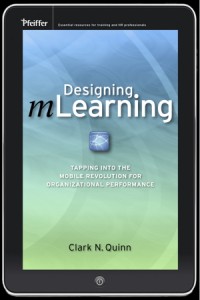Learning Lessons
Author: Clark
Go to Source
 So, I just finished teaching a mobile learning course online for a university. My goal was not to ‘teach’ mobile so much as develop a mobile mindset. You have to think differently than what the phrase ‘mobile learning’ might lead you to think. And, not surprisingly, some things went well, and some thing didn’t. I thought I’d share the learning lessons, both for my own reflection, and for others.
So, I just finished teaching a mobile learning course online for a university. My goal was not to ‘teach’ mobile so much as develop a mobile mindset. You have to think differently than what the phrase ‘mobile learning’ might lead you to think. And, not surprisingly, some things went well, and some thing didn’t. I thought I’d share the learning lessons, both for my own reflection, and for others.
As a fan of Nilson’s Specifications Grading, I created a plan for how the assessment would go. I want lots of practice, less content. And I do believe in checking knowledge up front, then having social learning, and a work product. Thus, each week had a repeated structure of each element. It was competency based, so you either did it or not. No aggregation of points, but instead: you get this grade if you do: this many assignments correct, and write a substantive comment in a discussion board and comment on someone else’s this many times, and complete this level on this many knowledge checks. And I staggered the deadlines through the week, so there’d be reactivation. I’ve recommended this scheme on principle, and think it worked out good in practice, and I’d do it again.
In many ways it ‘teacher proofs’ the class. For one, the students are giving each other feedback in the discussion question. The choice of discussion question and assignment both were designed to elicit the necessary thinking, which makes the marking of the assignment relatively easy. And the knowledge checks set a baseline background. Designing them all as scenario challenges was critical as well.
And I was really glad I mixed things up. In early weeks, I had them look at apps or evaluated ones that they liked. For the social week, I had them collaborate in pairs. In the contextual week, they submitted a video of themselves. They had to submit an information architecture for the design week. And for the development week, they tested it. Thus, each assignment was tied to mobile.
It was undermined by a couple of things. First, the LMS interfered. I wrote careful feedback for each wrong answer for each question on the knowledge checks. And, it turns out, the students weren’t seeing it! (And they didn’t let me know ’til the 2nd half of the abbreviated semester!) There’s a flag I wasn’t setting, but it wasn’t the default! (Which was a point I then emphasized in the design week: start with good defaults!)
And, I missed making the discussions ‘gradeable’ until late because of another flag. That’s at least partly on me. Which meant again they weren’t getting feedback, and that’s not good. And, of course, it wasn’t obvious ’til I remedied it. Also, my grading scheme doesn’t fit into the default grading schema of the LMS anyways, so it wasn’t automatically doable anyways. Next time, I would investigate that and see if I could make it more obvious. And learn about the LMS earlier. (Ok, so I had some LMS anxiety and put it off…)
With 8 weeks, I broke it up like this:
- Overview: mobile is not courses on a phone. The Four C’s.
- Formal Learning: augmenting learning.
- Performance Support: mobile’s natural niche
- Social: connecting to people ‘on the go’
- Contextual: the unique mobile opportunity
- Design: if you get the design right…
- Development: practicalities and testing.
- Strategy: platform and policy.
And I think this was the right structure. It naturally reactivated prior concepts, and developed the thinking before elaborating.
For the content, I had a small set of readings. Because of a late start, I only found out that I couldn’t use my own mLearning book when the bookstore told me it was out of print (!). That required scrambling and getting approval to use some other writings I’d done. And the late start precluded me from organizing other writings. No worries, minimal was good. And I wrote a script that covered the material, and filmed myself giving a lecture for each week. Then I also provided the transcript.
The university itself was pretty good. They capped the attendance at 20. This worked really well. (Anything else would’ve been a deal breaker after a disaster many years ago when an institution promised to keep it under 32 and then gave me 64 students.) And there was good support, at least during the week, and some support was available even over the weekend.
Overall, despite some hiccups and some stress, I think it worked out (particularly under the constraints). Of course, I’ll have to see what the students say. One other thing I’d do that I didn’t do a good job of generally (I did with a few students) was explain the pedagogy. I’ve learned this in the past, and I should’ve done so, but in the rush to wrestle with the systems, it slipped through the cracks.
Those are my learning lessons. I welcome your feedback and lessons!
The post Learning Lessons appeared first on Learnlets.
